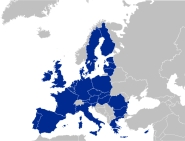Among yesterday’s most amusing moments in my microcosmos was when a Polish journalist asked the EU Commission’s press spokesmen at the daily press conference what comment the Commission had on Poland’s decision to investigate whether Teletubbies are propagating homosexuality.
“Does the Commission believe that the Teletubbies are of a bad influence on young children?”, the Polish journalist asked, audibly with her tounge firmly placed in her cheek.
“The Commission believes in the freedom of the media”, was the short answer, accompanied by roaring laughter from the press gallery.
Because, yes, this idea, which was first suggested by the late Rev. Jerry Falwell, has been revived in Poland, where child ombudsman Ewa Sowinska was to investigate Tinky Winky’s sexual orientation. The collected evidence for these allegations are:
1) Tinky Winky is purple.
2) Tinky Winky carries a handbag.
3) Tinky Winky’s head antenna is vaguely shaped like a triangle.
That’s it.
It may be laughable, especially when you start asking yourself in which ways any gender is associated with the Tubbies – for all I know, they could all be girls – or whether they are capable of having relationships with each other of such a nature that would make homosexuality, according to its biological definition, possible. But Ms. Sowinska took the whole thing very seriously and was to consult psychologists and their likes in order to reach at a verdict.
Today I heard that the whole investigation has been dropped. Congratulations, Polish taxpayers.
That leaves us Christians as the only ones still associated with this barmy statement. I do not know even where to begin being angry with all this.
Not only because of the very idea of having my faith connected with what is best named paranoid conspiracy theories, and not only because it attempts to curb free speech – even if this had turned out to be a gay lobby agenda, the rights for gays to promote their ideas is still my right to promote mine – but also because there is so much more worse garbage out there which is openly poisoning children’s minds, and where it is evident every day that the children copy what they see – in terms of violence and aggressive behaviour.
In fact, I have even had to remove a channel from or TV because our kids spent too much time watching cartoons that were clearly intended for an older audience, as they began learning violent behaviour from it. It took me about 45 seconds to exercise my right to choose in such a way, without having to call for government assistance. And another few minutes to explain to them why it is bad to hit people. Problem solved.
And therein lies probably the most ridiculous thing about all this. If you are uncomfortable with a flannel doll wearing pink, carrying a handbag, and having a triangle on its head, then, for crying out loud, switch to another channel or remove it from your dial. No-one is holding a gun to your head and forcing your kids to watch it.





 The travelling band commonly known as the European Union this month has its minsterial meetings in Luxembourg again (yes, indeed at
The travelling band commonly known as the European Union this month has its minsterial meetings in Luxembourg again (yes, indeed at  aren’t even pretending that there will be any outcome of that meeting; and when plenty of EU member states want the meeting called off altogether. (The reason for the fuss is a quick deterioration in EU-Russian relations, due to Russia’s blocking of Polish meat, which Poland takes as retaliation for being too friendly with the West, and due to Russia’s retaliation against Estonia for moving a Soviet-era monument, with thinly-veiled acts of economical warfare against EU member Estonia. Russia, on the other hand, seems to be having problems with the plans to post new US missiles in Poland and Hungary, pointing at Moscow.)
aren’t even pretending that there will be any outcome of that meeting; and when plenty of EU member states want the meeting called off altogether. (The reason for the fuss is a quick deterioration in EU-Russian relations, due to Russia’s blocking of Polish meat, which Poland takes as retaliation for being too friendly with the West, and due to Russia’s retaliation against Estonia for moving a Soviet-era monument, with thinly-veiled acts of economical warfare against EU member Estonia. Russia, on the other hand, seems to be having problems with the plans to post new US missiles in Poland and Hungary, pointing at Moscow.)










